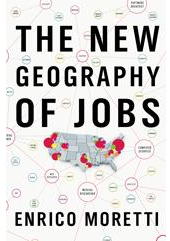The Multiplier Effect of Innovation Jobs
Because of a multiplier effect, each new high-tech job in the U.S. creates five additional jobs in the service economy, says economist Enrico Moretti.
Topics

Because of a multiplier effect, each new high-tech job in the U.S. creates five additional jobs in the service economy, says economist Enrico Moretti.
“An unprecedented redistribution of jobs, population, and wealth is under way in America, and it’s likely to accelerate in the decades to come,” argues Enrico Moretti in his new book The New Geography of Jobs (Houghton Mifflin Harcourt, 2012).
Moretti’s research gives form to a nagging sense that Americans who live in sluggish cities already know in their gut: Technological progress doesn’t affect American cities in the same way.
Instead, what Moretti terms a “Great Divergence” is developing between cities such as Seattle, Boston and Austin, the “new innovation hubs” that are “poised to become the new engines of prosperity” — and everywhere else.
A professor of economics at the University of California, Berkeley, Moretti writes that “the difference among communities in the United States is bigger than it has been in a century.” Workers in hot cities are making two to three times what identical workers make in cities that are losing ground.
Some highlights of Moretti’s research:
Job generation happens in clusters. “A handful of cities with the ‘right’ industries and a solid base of human capital keep attracting good employers and offering high wages, while those at the other extreme, cities with the ‘wrong’ industries and a limited human capital base, are stuck with dead-end jobs and low average wages,” Moretti writes. Ecosystems form in these hot cities, complete with innovation companies, funding sources, highly educated workers and a strong service economy.

Click here to look inside at Amazon.
Hot companies generate five times as many indirect jobs as direct jobs. Apple, Moretti says, employs 13,000 directly in Cupertino but has spurred 70,000 indirect jobs in the region. Two-thirds of American jobs are in the local service sector, he writes, and “the almost magical economics of job creation” are that “for each new high-tech job in a city, five additional jobs are ultimately created outside of the high-tech sector in that city, both in skilled occupations (lawyers, teachers, nurses) and in unskilled ones (waiters, hairdressers, carpenters).” What’s more, innovation “has a disproportionate effect on the economy of American communities.

Comments (10)
Akash Gautam
Eric Krock
Sarkari Naukri
Silicon Valley’s newest congressman wants tech giants like Apple to move jobs to the Midwest - Independent news and blog
Apple (AAPL), Google (GOOG) and other tech giants need to create jobs in the Midwest, says Silicon Valley's newest congressman Ro Khanna wants — Quartz
Poverty In Winston-Salem: Solutions Needed - Winston Watchman
Visualizing a Future without “Rust-Colored” Glasses | richeypiiparinen
Population Growth as the Cure for the Incredible Shrinking City? | richeypiiparinen
The Impact of Data Centers on Local Economies | Green Data Center Blog
Tehnoloogia areng suurendab asukoha tähtsust | Pärnu Konverentsid